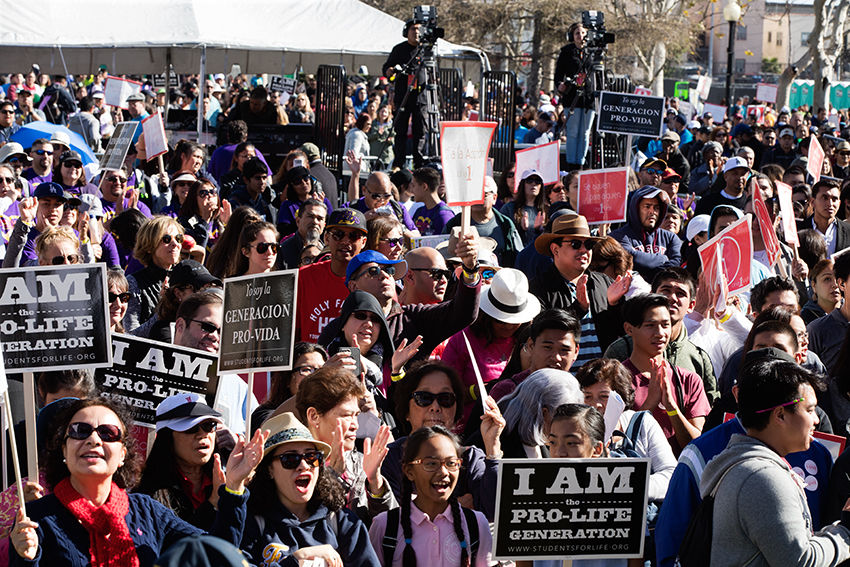Families, groups of college students and young professionals took advantage of the temporary break in rain to celebrate OneLife LA, the third annual event that drew a crowd of thousands to Exposition Park in Los Angeles.
On Jan. 21, the afternoon event focused on human resilience over adversity, proving through the many stories that were shared by celebrities and internationally recognized figures that life is worth living — and actively seeking to serve others allows for untold possibilities.
Archbishop José H. Gomez led the crowds gathered in a day of prayer, music and inspirational speakers.
An autistic 15-year-old boy took to the stage to sing “Open the Eyes of My Heart Lord” with his sister. Christopher Duffley is blind, but has perfect pitch, a talent that his family discovered when he took music therapy to develop his speech. His charismatic appeal was palpable, with the crowd joining him in singing.
He spoke of his myriad of health concerns that made his biological mother unable to care for him. His aunt came forward to adopt him. “The thought of bringing a blind child into her family was frightening at first. However, the belief that all life is precious and is a gift to bring into the world gave her great hope,” he told the crowds.
“And a family of six became seven,” he said of his adoptive family.
His talent was quickly recognized, “Before I knew it, I was singing at various sporting events, which have led me to sing for the Boston Red Sox three times. Go Sox!”
A YouTube video of Christopher singing went viral when he was 10. “And is still viral today,” he said to applause from the crowd. The attention led to an invitation to sing at Pope Francis’ visit to Washington, D.C.
“Jesus is still using my story to change hearts,” he said. “I am proud to say that I am pro-life.”
Kirk Bloodsworth told the crowd of his struggle to prove his innocence after prosecutors had sent him to death row. After almost nine years behind bars, Bloodsworth was exonerated after DNA fingerprinting evidence proved his innocence.
“In 1984 they didn’t have DNA,” Bloodsworth said. “And I didn’t know what to do because I was accused of one of the most brutal crimes in America.”
He added, “It took eight months to send me to death row, and the only thing my lawyer said was, ‘Good luck.’”
He found courage in prayer and reading the Bible. “My mother sent me the Bible in prison that I have to this day,” he told the crowd, but his mother wouldn’t live to see him acquitted. “My mother died five months before I got out.”
However, he credits his mother for his faith and pro-life beliefs. “My mother used to say, ‘If you don’t stand for something you’ll fall for everything.’ And I stand for something — I stand for life.”
When he was freed in 1993, he became the first person to be exonerated through DNA testing.
Immaculée Ilibagiza was the last to speak at the event. A survivor of the 1994 Rwandan Genocide, she told of coming out of three months of hiding to discover that she and her eldest brother were the last surviving members of her family.
“It was the end of the world,” she told the crowd. But she decided to forgive those who had tried to wipe out the Tutsis, her ethnic group. She learned English and moved to the United States, where she works with the United Nations and has become a New York Times bestselling author.
“No one has the right to take a life,” Ilibagiza said. She addressed abortion, asking mothers who were facing a difficult pregnancy to keep their baby. “Maybe that baby will be the next president of the country or a doctor who will take care of sick people.”
She added, “It’s not up to us to take life away.”
Ilibagiza also thanked everyone who had organized the event. “It takes a village to do something beautiful like this,” she said.

